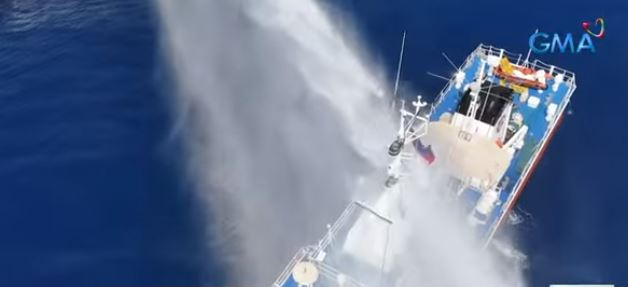China’s water cannons can kill, says PCG
Published May 1, 2024 10:02pm While the water cannon attack by the China Coast Guard (CCG) was not the first time, its increasing aggressiveness against Philippine vessels in the West Philippine Sea (WPS) has shown it could be “fatal,” a Philippine Coast Guard (PCG) official said. “If you are going to look at how it […]


While the water cannon attack by the China Coast Guard (CCG) was not the first time, its increasing aggressiveness against Philippine vessels in the West Philippine Sea (WPS) has shown it could be “fatal,” a Philippine Coast Guard (PCG) official said.
“If you are going to look at how it bent the railing of the Philippine Coast Guard vessel because of the water, obviously that would be very fatal,” PCG spokesperson Commodore Jay Tarriela said on a “24 Oras” report by Jun Veneracion.
CCG vessels on Tuesday fired water cannons at Philippine civilian vessels en route to Scarborough (Panatag) Shoal in the WPS for a supply mission.
PCG vessel BRP Bagacay suffered damage in its canopy and steel railing due to the water cannon attack by two bigger CCG vessels.
A Bureau of Fisheries and Aquatic Resources (BFAR) vessel, BRP Bankaw, which was part of the mission, was also water cannoned by Chinese vessels, the PCG had said.
The Philippine flag hoisted on the PCG vessel took a direct hit as well from the water cannon firing.
“It just goes to show that Goliath is becoming more Goliath, they don’t hesitate to use brute force to violate international law,” Tarriela said.
Despite the fresh incident, the Coast Guard official added, “We are not going to be deterred we are not going to yield despite all the harassment and provocative action. Hindi kami mapipigilan ng China (China cannot deter us),” he added.
In a separate report by Raffy Tima, who was aboard the Philippine vessel during the supply mission, it was said that both BRP Bankaw and BRP Bagacay sustained damages, including canopy and railings.
Following the incident, the two vessels slowed down to check their damages. The CCG and a Chinese Navy ship continued to trail them.
Meanwhile, a P3 Orion reconnaissance plane of the United States hovered.
The Philippine vessels proceeded with their supply mission 80 kilometers from the Panatag Shoal.
One by one, fishing boats of Filipino fishermen approached the vessels for free crude oil and other supplies. Some of the fishing vessels came from Infanta, Pangasinan.
Fisherman Pedro Manalo said he was angered by the water cannon attack. He said he and other fishermen also experienced harassment at sea.
“Medyo galit po, wala naman tayong magagawa (I’m a bit furious, but we can’t do anything about it),” he said.
While there are fewer incidents of harassment, Manalo said fishing in Panatag Shoal has become more difficult.
He thanked the PCG for the supply of crude oil, adding that because of this, he could extend his stay at sea for a week.
The PCG said it would continue its supply missions at sea to aid fishermen in their livelihood. —LDF, GMA Integrated News














